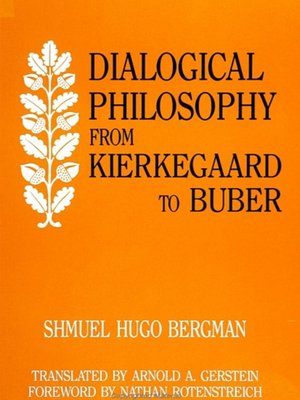Dialogical Philosophy from Kierkegaard to Buber
ebook ∣ SUNY series in Jewish Philosophy
By Shmuel Hugo Bergman

Sign up to save your library
With an OverDrive account, you can save your favorite libraries for at-a-glance information about availability. Find out more about OverDrive accounts.
Find this title in Libby, the library reading app by OverDrive.



Search for a digital library with this title
Title found at these libraries:
| Loading... |
This book introduces American readers to a philosophical and spiritual exemplar of dialogue. The author presents a way of thinking about ourselves, the world, and our relationship to God that is neither dualistic nor monistic. The thinkers presented in this book focus on a radical departure from objectivism and subjectivism. Kierkegaard, Feuerbach, Herman Cohen, Ferdinand Ebner, Eugen Rosenstock, Franz Rosenzweig, and Martin Buber were all trying to find a way to allow a transaction between self, the world, and God without foregoing either individuality or the experience of merging.
Some of the issues covered in the book include the origins of philosophy; objective versus existential truth; irony, truth, and faith; ethics versus aesthetics; ethics versus religion; thought and language; love of God and neighbor; I-Thou and I-It in Nature, with people, and with God; and redemption in the world.
Shmuel Hugo Bergman was Professor Emeritus in the Department of Philosophy at Hebrew University, Jerusalem. Arnold A. Gerstein is Professor of Humanities and Human Communication in the Department of General Studies at Western Michigan University, Kalamazoo.
Some of the issues covered in the book include the origins of philosophy; objective versus existential truth; irony, truth, and faith; ethics versus aesthetics; ethics versus religion; thought and language; love of God and neighbor; I-Thou and I-It in Nature, with people, and with God; and redemption in the world.
Shmuel Hugo Bergman was Professor Emeritus in the Department of Philosophy at Hebrew University, Jerusalem. Arnold A. Gerstein is Professor of Humanities and Human Communication in the Department of General Studies at Western Michigan University, Kalamazoo.






